PASSPORT: Creating a school-specific physical activity portfolio
Physical activity is important for children’s physical and mental health. The UK government recommends that all children should spend an hour each day doing something that gets them slightly hot, sweaty and out of breath.
Schools are key to helping children be physically active as almost all children attend them. However, by the end of primary school around half of children do not meet the recommended hour of physical activity each day.
There have been many different attempts to increase activity levels among children at school. With a few exceptions, these haven’t really worked. Most research studies use the same approach in each school to encourage children to be physically active. However, each school has a different setting, facilities, leadership and pupil profiles.
We need a new approach that supports schools to tailor physical activity programmes to their specific needs and context.
Project aims
This research study is looking at how to make school-based physical activity programmes that are tailored to individual primary schools.
We are creating a tool for schools to assess their physical activity provision and needs, identify any areas that can be improved, and develop bespoke programmes to support pupils’ physical activity. Once this tool is developed, we will test the approach to measure its success, to see if physical activity levels change.
What we did
This study is ongoing. Work completed so far has included:
- A review of physical activity programmes in schools, to find out what is already known about this topic
- Questionnaires to find out how schools across Bristol are supporting physical activity
- Interviews with primary school staff and wider communities to find out which aspects of a school play a role in helping children to be physically active
- Research in three primary schools to help understand their systems, decision making and priorities, and how these impact children’s physical activity
- Designing a trial to assess how well our tool to support physical activity in schools works
What we found and what this means
From our research so far, we have a broad sense of how schools across Bristol are supporting physical activity. We also understand which aspects of a school play a role in helping children to be physically active.
Based on this knowledge, we have produced a set of interventions that could be introduced in schools to increase children’s physical activity. We have also designed a trial to assess how well the tool we are developing to support physical activity in schools works.
What next?
We are creating a tool to support physical activity in schools, in workshops with school staff. This tool will help schools assess their physical activity provision and needs, identify any areas that can be improved, and develop bespoke programmes to support pupils’ activity. We are using the insight and evidence from our research so far to develop this tool. Once it is developed, we will trial the approach to measure its success.
Papers
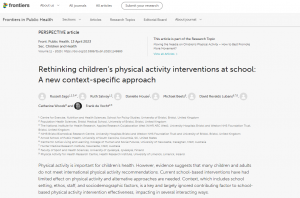
Rethinking children’s physical activity interventions at school: A new context-specific approach
Read the paper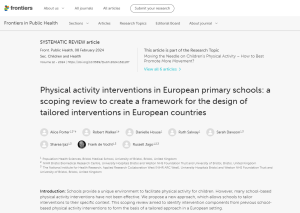
Physical activity interventions in European primary schools: a scoping review to create a framework for the design of tailored interventions in European countries
Read the paper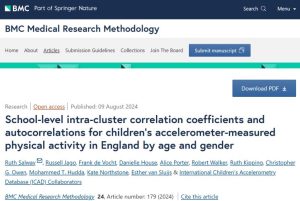
School-level intra-cluster correlation coefficients and autocorrelations for children’s accelerometer-measured physical activity in England by age and gender
Read the paper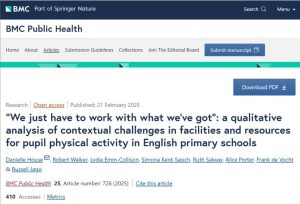
“We just have to work with what we’ve got”: a qualitative analysis of contextual challenges in facilities and resources for pupil physical activity in English primary schools
Read the paper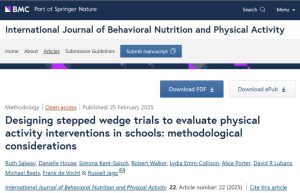
Designing stepped wedge trials to evaluate physical activity interventions in schools: methodological considerations
Read the paper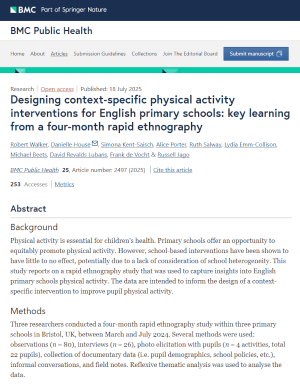
Designing context-specific physical activity interventions for English primary schools: key learning from a four-month rapid ethnography
Read the paper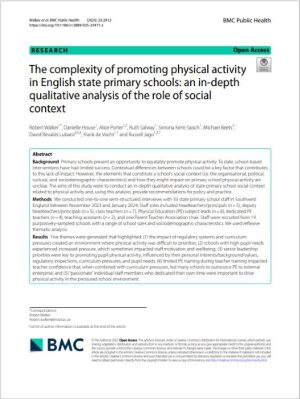
The complexity of promoting physical activity in English state primary schools: an in-depth qualitative analysis of the role of social context
Read the paper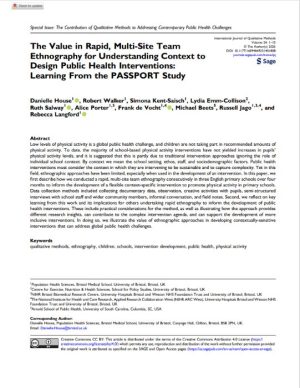
The Value in Rapid, Multi-Site Team Ethnography for Understanding Context to Design Public Health Interventions: Learning From the PASSPORT Study
Read the paperLead collaborators
- Professor Charlie Foster, University of Bristol
- Dr Ruth Salway, University of Bristol
ARC West Staff
Dr Carmel McGrath
Senior research fellow in Public InvolvementDr Sharea Ijaz
Research Fellow in Evidence SynthesisZoe Trinder-Widdess
Head of CommunicationsProfessor Frank de Vocht
Applied Data Sciences Team Co-leadPartners on this project
University of Bristol
The University of Bristol is internationally renowned and one of the very best in the UK, due to its outstanding teaching and research, its superb facilities and highly talented students and staff. Its students thrive in a rich academic environment which is informed by world-leading research. It hosts the Elizabeth Blackwell Institute for Health Research.



